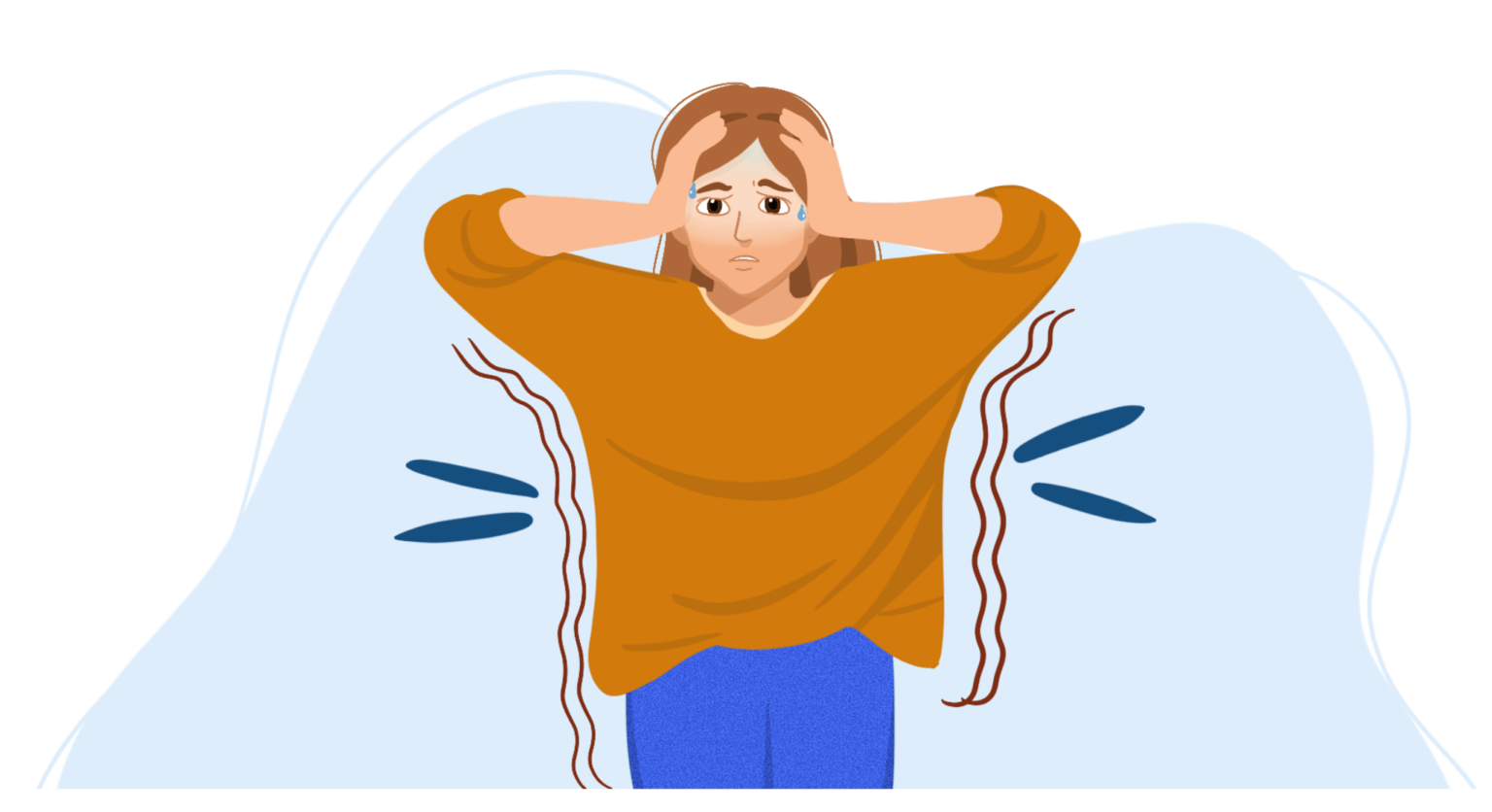Dentist anxiety is the fear of dentists and dental offices. People also refer to this as dental anxiety or dental fear, and in severe cases when it is an extremely unexplainable irrational fear and feeling of anxiety it is called dental phobia. Other terms used for this condition are odontophobia, dentophobia, or dentist phobia. Dentist anxiety is a topic that has been around for some decades. In recent years many studies have been done in regard to the etiology of dental anxiety, its signs and symptoms, and how to get over it.
Let’s have a deep look at all these aspects together.
What are the signs and symptoms of dentist anxiety or dentist phobia?
Anxious patients can have a wide variety of signs and symptoms which we can put into two main categories: Physical signs and psychological signs. Anxiety levels vary as well. Not all of these symptoms mentioned here might be present in a patient with dentophobia. Whether it is reasonable or unreasonable fear you can look out for these signs and symptoms to understand dentist anxiety better.
| Physical signs | Psychological signs |
| Sweating | Distress |
| Racing heart | Withdrawal mechanisms |
| High blood pressure | Difficulty sleeping the nights |
| Dizziness | Crying |
| Dry mouth | Avoiding the dentist/postponing the appointment |
| Nervous stomach | Nervousness |
| Shaking | Racing thoughts |
The possible reasons for dental anxiety
Reasons for dentist anxiety can originate from either external or internal triggers. This means the fear and anxiety can be due to external factors such as environmental triggers and what happens in a dental office that affects the patients. Internal triggers come from within such as medical and mental health issues that lead to extreme fear.
- Traumatic experience: Dental anxiety can be due to bad dental experiences. An invasive dental treatment that led to pain and complication creates a bad memory for the patient and makes them afraid to undergo another dental procedure. Bad experiences especially in childhood cause more fear and anxiety.
- Vicarious learning through others and social media: Not always a direct traumatic event is a reason behind dentist anxiety, something learning of others’ misfortunate experiences can create a negative image in the individual’s mind and cause a dental phobia. Another factor that contributes to dental fear is social media. Stories that are shared on mass media and internet platforms affect people.
- Fear of dental equipment: Needles, drills, and other dental equipment scare many people. Harsh and scary noises caused by different dental tools induce anxiety and distress. People do not have a clear understanding of what these devices do when they are put into their mouths and this adds up to their fear.
- Fear of blood: Many people fear bleeding and seeing blood come out of their bodies. When it comes to bleeding during a dental procedure they see blood there is no exception for them, even if it’s a few drops.
- Fear of choking: Some people have this fear that when they have their mouths numbed by the medications, they might choke on their blood or saliva.
- Lack of personal space: Many people might feel intimidated when a person gets too close to them. They feel their privacy is invaded and as a result, they show fearful responses.
- Mental disorders: Even though dentophobia or dentist anxiety is considered a mental disorder, there are other mental illnesses that might contribute to this condition as well. These mental conditions can cause a patient to experience feelings of distress and anxiety when they go to the dentist. Some of these mental disorders are depression, bipolar, schizophrenia, and post-traumatic stress disorder (PTSD) to name a few.
- Heritability: A study published by Ray et al. showed there’s a genetic component responsible for dental fear and anxiety, thus dentist anxiety can be inherited from parents.
How to deal with dentist anxiety?
Dentist anxiety is a disorder that requires management and treatment. Two main components that contribute to managing anxiety are the patient and the dentist.
Let’s see how to deal with dentist anxiety.
How can your dentist help you to get over your anxiety?
Your dentist can be a big help to relieve your stress, as they encounter many patients that suffer from the same condition as you. An expert dentist knows how to handle the situation and help you overcome your fear.
Dentists should know how to be mindful of their patient’s psychological state
Oral health concerns are important and at the same time, they are easily ignored by patients. This will happen more in anxious patients. For healthcare professionals to better help these patients, the missing link between dentistry and psychology must be mended. The first step to take to mend this missing link is to understand the patient’s psychological state and how to better accommodate it.
The dentist and dental team should provide a relaxing environment
A helpful question to ask here is how you perceive your environment. The answer is with your sensory system. Your dentist and their team can put together a comfortable and cozy place. Some calming music and an essential oil diffuser can do the trick. For dental patients with higher anxiety levels eye masks and earplugs can be helpful as well. It can be a good idea to provide a screen for the patient while they are in the dental chair to watch something they would enjoy to calm them down.
The dentist may offer the patient analgesia, sedation, and medication options
Nitrous oxide or laughing gas is a method some dentists use to help patients relax during dental treatment. The patient is awake during the procedure but is relaxed and stress-free. Conscious sedation is a very helpful technique for people with severe anxiety. Dentists can prescribe medications to relieve anxiety to help patients remain relaxed during the process. This is usually a single-dose tablet given to the patient to take before the appointment with a short action duration.
What can you do to manage this anxiety?
A person with dental anxiety should look for ways to manage the situation. There are a variety of useful options to benefit from.
Psychological coping mechanisms and techniques
Discussing your condition with a psychologist or a psychiatrist helps you learn coping mechanisms and face your fears in a confident way. These techniques are:
- Deep breathing exercises: This is one of the most well-known practices against stress and anxiety. Taking deep breaths helps alleviate tension by taking more oxygen to the body, and regulating the altered breathing pattern caused by anxiety.
- Guided imagery: This is a nice method to release stress. The person will picture positive and pleasant visions. By illustrating nice images in the mind the person becomes calm and less anxious.
- Graduated exposure or systematic desensitization: This is a psychiatric therapy that gradually exposes the anxious patient to a situation that is afraid of. By slowly facing the situation, the patient becomes less frightened and learns that the condition is not as scary and stressful. By experiencing the situation step-by-step, the patient finds the opportunity to discover all of its hidden aspects that they were not able to see due to intense fear. This exposure-based treatment makes the situation less intimidating.
- Meditation and muscle relaxation: Meditation helps individuals concentrate on different parts of their bodies and have control over them. Muscles become tense as a result of stress which leads to more discomfort and anxiety. A useful way for muscle relaxation is to meditate and focus on them.
- Mindfulness: This is a new and specialized way of meditation. Mindfulness means paying attention to your surroundings, your current situation, your thoughts, your sensations, and your position at the moment without judging or analyzing them. Mindfulness is all about being aware of what’s around you and accepting it without judging or overreacting.
- Distraction: By not paying attention to the inconvenient situation and distracting themselves, the patients can be at ease and avoid a negative experience. Listening to music or touching a comforting device can be good options for distraction. You can always take an object with you that gives you comfort and helps you remain calm.
- Hypnotherapy: Also known as hypnosis is an induced relaxed state or dream done by a trained and expert person. This helps the patient cope with the fear of pain, anxiety, and stress.
Other relaxation techniques such as drinking tea or doing yoga before the appointment can be useful in managing stress. Discuss this with your dentist to see if it might interfere with your treatment.
Take a company with you
A family member or friend who is close to you can accompany you to the dentist’s office. The presence of a loved one, can make the atmosphere less intimidating and more reassuring. If possible, holding their hands or hearing their voice can be a great relief.
Let your dentist know
Speaking up about your dental anxiety, especially before the appointment helps the dentist and the staff to cooperate better and help you if needed. The dentist can explain the whole process in detail, so you will know what is about to happen and be less nervous about it. Don’t hesitate to ask all your questions and express your concern.
How extreme anxiety at the dentist affects your oral health?
Undoubtedly, dental visits are crucial to maintaining a good dental care routine and good oral health subsequently. Dental anxiety leads to avoiding dental treatments. This causes dental health deterioration and problems. As a result, the person is embarrassed to visit the dentist, and even if they do they will need more aggressive and intense treatments due to their teeth condition. This adds up to their fear and anxiety and therefore a vicious cycle is created. Avoidance of dental care due to anxiety can result in dental health complications such as tooth decay, cavities, tooth loss, periodontal disease, and gum disease.
Many oral health issues such as mouth cancer are detected through regular check-ups. Preventive care is another essential outcome of dentistry, which will be lost due to not showing up for dental appointments.
Irrational fear of dentists and dental work affects not only dental health but also overall health. Poor oral health can result in many health complications such as cardiovascular diseases, respiratory disorders, diabetes, general bloodstream infection, and even brain abscess. In simple words, fear of a dentist can affect your quality of life.
Reference:
Beaton L, Freeman R, Humphris G. Why are people afraid of the dentist? Observations and explanations. Med Princ Pract. 2014;23(4):295-301. doi: 10.1159/000357223. Epub 2013 Dec 20. PMID: 24356305; PMCID: PMC5586885.
Widiger TA, Oltmanns JR. Neuroticism is a fundamental domain of personality with enormous public health implications. World Psychiatry. 2017 Jun;16(2):144-145. doi: 10.1002/wps.20411. PMID: 28498583; PMCID: PMC5428182.







